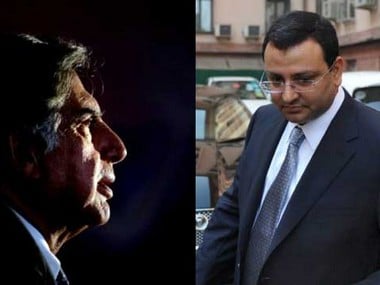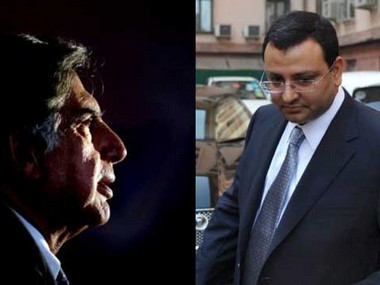The words and news leaks are flying back and forth between Bombay House, the godly abode of the pre-eminent Tata group, and the other party, known more humbly as the Mistry Camp. This might be a battle between David and Goliath, if the might of the Tatas is pitted against the very rich, but in a political way much humbler Cyrus Mistry. But it is becoming increasingly clear that the deposed chairman of Tata Sons has several cards up his sleeve that go beyond the minority 18 percent he controls in the closely held flagship of the Tata empire in which the Tata trusts led by Ratan Tata, between them control more than 65 percent. [caption id=“attachment_3094060” align=“alignleft” width=“380”]  Ratan Tata, incumbent chairman, Tata Sons and Cyrus Mistry, ousted chairman. AFP[/caption] The scene is in many ways reminiscent of the Indian National Congress, which split vertically exactly 47 years ago to this month. On 12 November, 1969, Indira Gandhi was expelled from the party even as she led the nation as prime minister on the grounds that she violated party discipline when she fielded V V Giri as the presidential candidate and called for a “conscience vote” that ousted the official party candidate, Neelam Sanjeeva Reddy. Tata Sons has ousted Cyrus Mistry in what it considered the interests of Tata “values” in a resemblance to Mrs. Gandhi’s expulsion. The battles now shift to each Tata-led company in which Mistry continues to be chairman. Now the big questions: Does the Congress party exist for the people of India or does it exist for the rules and regulations of the party? Does Tata Sons exist for the upkeep of the Tata values as defined by the Parsi community trusts or does it exist as the custodian of the shareholders of the publicly-held and some other companies under its management and supervision? In that autumn of 1969, Indira Gandhi was pitted against giants such as S K Patil, Morarji Desai, S Nijalingappa and K Kamaraj. The opponents of Mrs. Gandhi, known then as the “Syndicate” were against the woman who was until then known as the Goongi Gudiya (Silent Doll). It turns out Indira’s group called Congress (Requisition) – eventually got the backing of 446 of the 705 votes in the All India Congress Committee and ended up later as the “real” Congress. The Indian National Congress under Indira also got 44 percent of the national votes in the next general election held in 1971, taking 352 of the 518 Lok Sabha seats. The old stalwarts got less than fourth of that. Can Mistry now pull off an Indira-style revolution? This may not be easy because analogies cannot be stretched too much. Mistry’s big bet is for shareholder democracy in group companies in which Tata Sons does not have the same hold that Tata trusts have over Tata Sons itself. With some independent directors including respected figures like Deepak Parekh coming out in favour of Mistry, the field is wide open. The battles may differ from company to company. From all indications, Ratan Tata will try his political clout to sway public sector financial institutions such as the Life Insurance Corporation to vote in favour of his strategy. (Remember, Tata Nano, whose investment is at the heart of Mistry’s tussle with Bombay House giants, is being manufactured in the prime minister’s home state, Gujarat). Between the financial institutions and minority shareholders, a lot will be said and done. Every Tata company has a unique shareholding structure and numbers will be counted in each with its unique balance of power. It is clear, however, that three hard questions are bound to be raised: • Did Cyrus Mistry act in the interest of minority shareholders of Tata group companies when he blew the whistle (as many might say) on the accounts of Tata-led companies and spoke of a $18-billion write-down ? • Does Tata Sons act primarily in its own interests as a closely held company or as a custodian of minority shareholders of the companies it indirectly controls and manages for most part? • Will mutual funds, which are not usually known to be active in corporate battles in India, be led by investment advisory firms and the views of independent directors? It is worthwhile recalling that Ratan Tata faced a controversy in the 1990s when Tata Sons wanted group-led companies to pay fees for the use of the Tata brand. Shareholders were not exactly happy. Tata Sons continues to get brand fees. Questions are bound to be raised on what Tatas bring to the table. Unlike Indira Gandhi, who swept to power with her Garibi Hatao slogan in 1971, Mistry may not have similar charisma. But his call for accountability in corporate governance smacks of a similar appeal to minority shareholders and financial institutions. Will government-led financial institutions bat for the “Syndicate” or the challenger? Whatever the detail, the case is reminiscent of the Congress in 1969. Shareholder democracy and political democracy can have striking parallels.
Tata Sons has ousted Cyrus Mistry in what it considered the interests of Tata “values” in a resemblance to Mrs. Gandhi’s expulsion.
Advertisement
End of Article


)

)
)
)
)
)
)
)
)



